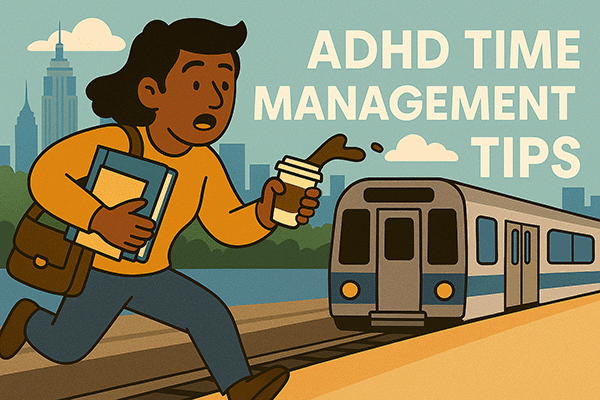Time Management Strategies for NYC Professionals with ADHD
Procrastination. Avoidance. All-nighters. Waiting until the last minute.
Let’s face it—time management is especially hard if you have ADHD.
There are so many hours and minutes to manage in a day, and an enormous amount of pressure to use that time effectively. If you have ADHD, executive functioning challenges can make it even harder to plan ahead, stay organized, and get things done on time.
Many adults feel shame around their time management struggles—but the truth is, this isn’t a character flaw. It’s a common part of how ADHD shows up. You're not alone, and you’re not lazy.
At our NYC-based therapy practice, we help adults with ADHD build systems that work with their brains, not against them. In this article, I’m sharing five time management strategies that are especially helpful if you have ADHD—and you can begin using them today.
1. “Calendaring”
That’s right—we’ve turned it into a verb.
Calendaring means choosing a calendar system you actually enjoy using and building a habit of using it every day. This is especially important if you have ADHD, where novelty and visual clarity can make or break a routine.
I personally use Notion Calendar—it’s flexible and easy to customize. Whatever tool you use, the key is consistency. At first it may feel forced, but with repetition, it becomes a grounding part of your day.
2. Timing and Estimating
Adults with ADHD often underestimate or overestimate how long things take—a common executive function issue.
I’ve been guilty of this myself. I used to show up way too early or rush at the last minute. The fix? Spend a couple of weeks timing your common tasks—your morning routine, your commute, emails, cleaning, etc.
With that data, you’ll be able to plan more realistically. This builds confidence and reduces the frustration of always feeling “behind.”
3. Time Blocking
Once you know how long things take, try time blocking—scheduling specific tasks or routines directly into your calendar.
People with ADHD often benefit from having a visual map of the day. Seeing how the hours are laid out (with built-in reminders) helps ease transitions and reduce overwhelm.
You can block time for work, errands, rest, even meals and sleep. It’s not about perfection—it’s about creating structure where your brain might otherwise resist it.
4. Task Manager
Keeping everything in your head just doesn’t work—especially for ADHD brains.
Pair your calendar with a task management system where you can brain-dump, organize, prioritize, and set reminders. This is one of the best ways to reduce mental clutter and anxiety.
There are many ADHD-friendly options—like Notion, Todoist, or Things. Don’t be afraid to experiment until you find a setup that sticks.
5. Sacrifice
Here’s the tough truth: you can’t do it all—and that’s okay.
Trying to squeeze everything in often leads to burnout and disappointment, especially for people with ADHD who are drawn to novelty or struggle with saying no.
Instead, try this: consciously choose what you’re not going to do. That might mean skipping a social event to recharge or saying no to a last-minute project. You’ll feel the sting of letting something go—but it’s far less stressful than the chaos of trying to do it all.
Final Thoughts
At PRGRS Therapy, we specialize in helping adults with ADHD in New York City build better systems for time, tasks, and daily life. Whether you’re a working professional, student, or entrepreneur, you deserve support that understands how your brain works.
We offer virtual therapy across New York and would love to talk with you.
Book a free 10-minute consultation to see how we can help you manage time and reduce overwhelm.

